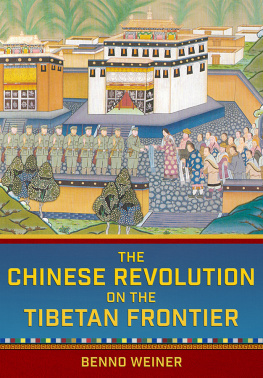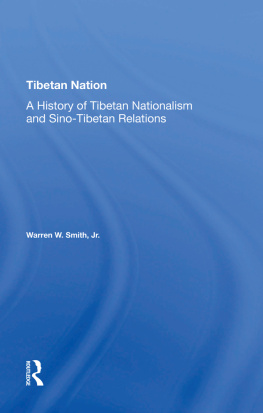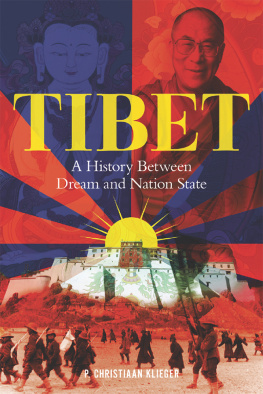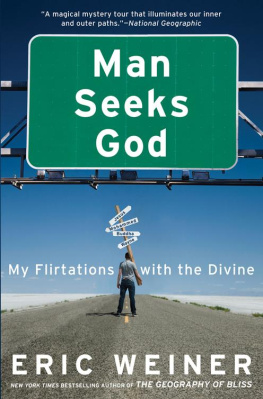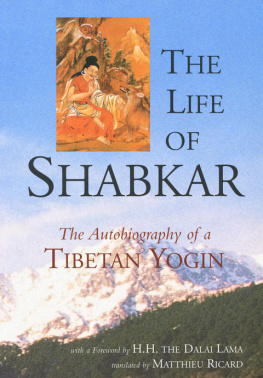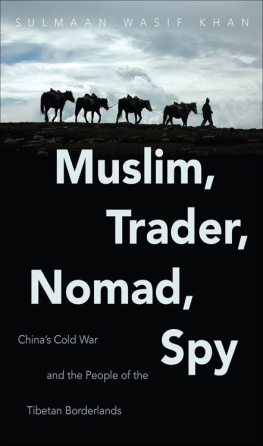
Studies of the Weatherhead East Asian Institute, Columbia University
The Studies of the Weatherhead East Asian Institute of Columbia University were inaugurated in 1962 to bring to a wider public the results of significant new research on modern and contemporary East Asia.
Publication of this book was made possible, in part, by a generous grant from the Chiang Ching-kuo Foundation for International Scholarly Exchange.
Copyright 2020 by Cornell University
All rights reserved. Except for brief quotations in a review, this book, or parts thereof, must not be reproduced in any form without permission in writing from the publisher. For information, address Cornell University Press, Sage House, 512 East State Street, Ithaca, New York 14850. Visit our website at cornellpress.cornell.edu.
First published 2020 by Cornell University Press
Library of Congress Cataloging-in-Publication Data
Names: Weiner, Benno, 1972 author.
Title: The Chinese revolution on the Tibetan frontier / Benno Weiner.
Description: Ithaca [New York] : Cornell University Press, 2020. | Series: Studies of the Weatherhead East Asian Institute, Columbia University | Includes bibliographical references and index.
Identifiers: LCCN 2019036104 (print) | LCCN 2019036105 (ebook) | ISBN 9781501749391 (hardcover) | ISBN 9781501749421 (pdf) | ISBN 9781501749414 (epub)
Subjects: LCSH: MinoritiesGovernment policyChinaTongren Xian (Qinghai Sheng)History20th century. | CommunismChinaTongren Xian (Qinghai Sheng)History20th century. | Tongren Xian (Qinghai Sheng, China)History20th century. | Tongren Xian (Qinghai Sheng, China)Politics and government20th century. | Tongren Xian (Qinghai Sheng, China)Ethnic relationsPolitical aspects. | Tongren Xian (Qinghai Sheng, China)RelationsChina. | ChinaRelationsChinaTongren Xian (Qinghai Sheng)
Classification: LCC DS793.T7 W378 2020 (print) | LCC DS793.T7 (ebook) | DDC 323.1195/4105147dc23
LC record available at https://lccn.loc.gov/2019036104
LC ebook record available at https://lccn.loc.gov/2019036105
Cover image: On August 6, 1952, Qinwang Tashi Tsering Welcomes the Henan Mongol Banner Work Committee; detail from Thangka of the Mongol History South of the Yellow River, by permission of Ute Wallenbck, from her personal collection.
For my parents
Illustrations
Maps
Figures
Acknowledgments
Long ago, while flying over the Pacific Ocean on a now long-defunct airline, I salvaged a fortune cookie from an otherwise inedible airplane boxed meal. I was on my way to China to start research for what after many twists and turns turned into this book. Feeling increasingly unsure of myself as I got closer to my destination, I cracked open the cookie, pulled out the white strip of paper, and read, All your hard work will pay off in the end. At the time, it seemed like a serendipitous if trite omen. In the years since, however, there were more than a few moments when it appeared that the fortune inside the cookie may have been mistaken. That it was not is a testament to the remarkable support I have received from friends, family, and colleagues near and far.
At Columbia University, where this project began, I was fortunate to work with a group of wonderful scholars, teachers, and mentors. Not only did Robert Barnett introduce me to Tibetan studies, but he also was the first person to take a genuine interest in me as a scholar. Without his guidance and friendship, this book never would have been written. Madeleine Zelin has been a constant source of encouragement, patience, and sound advice. Gray Tuttle, who has done as much as anyone to make the study of Amdo a legitimate and active field of historical inquiry, has been an inspiration, advocate, and mentor. Eugenia Lean, Morris Rossabi, Guobin Yang, Thomas Bernstein, and Gulnar Kendirbai have all been more instrumental in my career than they likely realize.
I am particularly grateful to colleagues and friends who selflessly gave their time and energy to read and provide valuable feedback on the manuscript: David Atwill, Kelly Hammond, Charlene Makley, Max Oidtmann, Brenton Sullivan, and Dominique Townsend, as well as two anonymous readers. Their contributions to this book cannot be overstated. Special thanks go to Lauran Hartley, Chengzhi Wang, and Chopothar of Columbias Star East Asian Library. Language instructors are the unsung heroes of East Asian studies. I would especially like to acknowledge Tenzin Norbu Nangsal, Liu Lening, Meng Yuan-Yuan, and all of the instructors at Tibet University.
I owe debts of gratitude to more people than I can possibly thank here. Some introduced me to a new contact, others pulled aside a useful document, many helped with a translation or cleared up a misconception, most gently nudged (and sometimes shoved) me in the right direction, and all provided encouragement and support. It is with great sadness but I hope an overabundance of caution that I cannot thank many people in the Amdo region and beyond by name. Thank you, Ed Behrend-Martinez, Sandrine Catris, James Cook, DL, Jason Deathridge, Kristen Deathridge, Xnia de Heering, D, DT, Andrew Fischer, Joshua Freeman, Wendy Goldman, GK, Gedun Rabsal, Arunab Ghosh, Melvyn Goldstein, GT, Andrew Grant, GT, Brent Haas, Donna Harsch, Bianca Horlemann, JK, LG, James Leibold, Vincent Leung, Emily Leyava, Bill Lindeman, Jonathan Lipman, David Luesink, Covell Meyskens, Da Pejcha Mortensen, MW, Ruth Mostern, Thomas Mullaney, N, Carla Nappi, Paul Nietupski, Philip, Christopher Phillips, Steven Pieragastini, Annabella Pinkin, PW, Scott Reylea, Franoise Robin, Gerald Roche, Pernille Rge, Jomo Smith, Steven, Donald Sutton, Noah Theriault, Tsehua Jia, TT, TD, TD, Stacey Van Vleet, Ute Wallenbck, WW, WX, Molly Warsh, Jason White, Nicole Willock, Yuxiu Wu, Lan Wu, Yang Hongwei, Yongdrol Tsongkha, Zhaojin Zeng, and the faculty and staff at Carnegie Mellon University and Appalachian State University.
My editor Emily Andrew has shepherded this book to completion with a combination of professionalism and compassion that is deeply appreciated. Thank you also to Ross Yelsey, Bethany Wasik, Sarah Noell, Susan Specter, Don McKeon, and everyone at Cornell University Press and the Weatherhead East Asian Institute. The wonderful maps were created by Mike Bechthold. The cover art was generously provided by Ute Wallenbck from her personal collection.
Major funding for the initial stages of research was provided by a Fulbright Hays DDRA grant. At every stage thereafter, I benefited from a variety of fellowships and grants, including a Sasakawa Young Leaders Fellowship and a V. K. Wellington Koo Fellowship. A China and Inner Asia Council Small Grant from the Association for Asian Studies and a Falk Fellowship in the Humanities from Carnegie Mellons Dietrich College provided essential support for a final round of research needed to complete the manuscript. A Chiang Ching-Kuo Foundation Publication Grant and a second Falk Fellowship helped in the final stages of turning the manuscript into a book.
Over many years and across continents, the friendship of Alastair Hunt and Felicia Koh, Zachary Waldman, and Dirk Eschenbacher and Lea Chen has been one of the few constants. Kelly, I am not sure I could have made it to the finish line without your companionship, encouragement, and commiseration. Although separated from me by distance, my siblings Josh, Carl, and Jessica have always been at my side. Macayla Ann and Ava, this book project is almost as old as you. Thank you for being who you are. You mean everything to me. This book is dedicated to my parents, Ellen and Dan, the most generous, loving, and creative people I know. Thank you.
Next page
